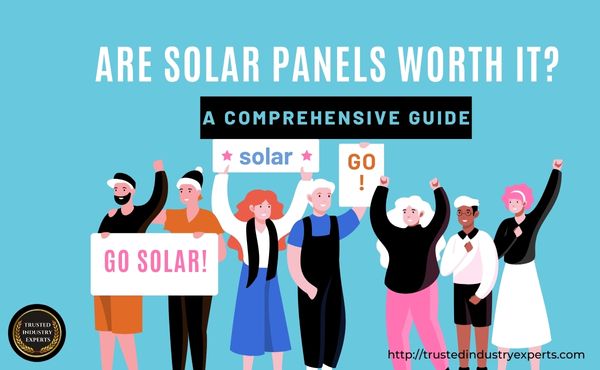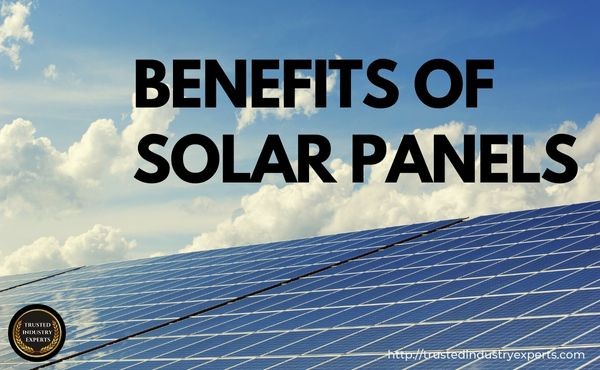
Are Solar Panels Worth It? A Comprehensive Guide
As the world moves towards a more sustainable future, many homeowners are considering the install solar panels. Not only do solar panels provide clean and renewable energy, but they also offer significant financial benefits.
But are solar panels really worth it? In this article, we will explore the various factors that determine whether or not solar panel are worth the investment.
Benefits of Solar Panels
The most obvious benefit of solar panel is the reduction in electricity bills. By generating their own power, homeowners can significantly reduce their dependence on the grid and lower their monthly expenses. This can result in significant savings over time, especially in states with high electricity rates.

Solar panels also increase the value of a home. In many cases, homes with solar panels sell for more than homes without them. This is because solar panels are seen as a valuable addition to a home and can be a selling point for potential buyers.
Another benefit of solar panels is their environmental impact. Solar panels produce clean and renewable energy, which reduces the carbon footprint of a home. This not only helps the environment but also contributes to the overall sustainability of the planet.
Cost of Solar Panels
One of the biggest concerns for homeowners considering solar panels is the cost. While the upfront cost of installation can be substantial, it is important to consider the long-term savings and financial benefits.
The cost of solar panels has decreased significantly in recent years, making them more accessible to homeowners. In addition, there are various financing options available, such as leasing and power purchase agreements, which can make the installation process more affordable.
It is also important to consider the various local incentives and tax credits available for solar panel installations. In many states, homeowners can receive significant tax credits and rebates for installing solar panels, which can offset the cost of the installation.
ROI and Payback Period
The return on investment (ROI) and payback period for solar panels vary depending on several factors, such as location, electricity usage, and system size. On average, homeowners can expect a payback period of 7-12 years, with an average ROI of 12-15%.
It is important to consider the long-term financial benefits when calculating the ROI and payback period. Solar panels can provide significant savings over the course of their lifetime, which can result in a positive ROI.
Factors That Affect Solar Panel Performance
There are several factors that can affect the performance of solar panels, including:

Location
The amount of sunlight a location receives is one of the most important factors in determining the performance of solar panels. Areas with more sunlight will generate more energy, resulting in greater savings.
Harnessing the Power of the Sun: Why Solar Energy is a Smart Choice for Homeowners
Are you looking for ways to reduce your carbon footprint and save money on energy costs? Solar energy is an increasingly popular option for homeowners who want to make a conscious effort to preserve the environment.
One of the most important factors in determining how much energy your solar system will generate is the amount of sunlight that your location receives. Let’s explore why solar energy is a smart choice for homeowners.
Harnessing Renewable Energy with Solar Panels
Solar power uses photovoltaic cells—or PV cells—to convert sunlight into electricity. This electricity can be used to power homes, businesses, and even cars. It’s renewable, meaning that it doesn’t run out like fossil fuels do; instead, it will keep providing energy as long as there’s enough sunshine to power it. And since solar panels can last up to 25 years or more with proper maintenance, you can rest easy knowing that you won’t have to worry about replacing them anytime soon!
Maximizing Your Savings with Solar Panels
The amount of sunlight your location receives directly impacts how much electricity your solar panels are able to generate. The sunnier the location, the more efficient they will be at producing electricity. To maximize their efficiency and therefore increase your savings, consider installing solar panels on roofs or other areas that get plenty of direct sunlight during peak hours (typically between 10 am and 4 pm).
Additionally, if you live in an area that experiences frequent cloudy days during peak hours, consider investing in solar batteries which store excess energy generated by your system so you can still access it when the clouds roll in.
Making a Positive Impact on Our Environment
In addition to reducing monthly energy bills and maximizing savings over time, solar panel system also help reduce our collective carbon footprint by relying on renewable sources of energy instead of fossil fuels like coal and oil which produce harmful emissions when burned for fuel.
According to data from the National Renewable Energy Laboratory (NREL), each year Americans using home solar panel systems offset approximately 1 million metric tons of CO2 emissions from conventional sources of electricity generation! By investing in a solar panel system today, you are making a conscious choice to help protect our planet for generations to come.
It’s clear that there are numerous benefits associated with investing in a home solar panel system today. Not only will homeowners save money on their monthly energy bills but they will also reduce their carbon footprint while helping preserve our planet for future generations!
With the right setup and plenty of direct sunlight during peak hours, homeowners can maximize their savings while ensuring their system runs efficiently all year long – no matter what Mother Nature throws at us! So why wait? Start harnessing the power of the sun now and make your home greener than ever before!
Orientation
The orientation of the solar panels is also important. Panels should be oriented towards the sun to maximize energy generation.
Maximize Your Solar Savings with the Right Solar Panel Orientation
Are you considering switching to solar energy and wondering how to maximize your solar savings? One of the most important factors when it comes to making the switch is proper orientation of your solar panels. The goal is to make sure that your photovoltaic panels are always facing towards the sun so that you can capture as much of its rays as possible, thus maximizing your electricity production. Let’s take a look at why this is important and what you need to know about finding the right orientation for your home.
Utilizing The Sun’s Rays To Their Full Potential
When you set up a solar system in your home, you want to make sure that each panel is oriented towards the sun in order to capture as much of its rays as possible. This will help ensure that you get the most out of your federal investment tax credit, which provides a credit for 26% of installation costs on newly installed solar systems on residential properties in 2021. Additionally, it will also reduce your energy costs by providing more electricity produced from solar power than what would have been generated without orienting them properly.
In addition to taking advantage of this incentive and reducing energy bills, properly positioning photovoltaic panels can also help increase their efficiency and extend their lifespan by allowing them to capture more sunlight. To determine how much power your system can produce during peak periods, consult with a reputable solar company or certified energy practitioners who can analyze how much sunlight each panel receives depending on its orientation.
Careful Considerations When Orienting Solar Panels
It’s important to keep in mind that there are lots of considerations when deciding how best to orient your solar energy system for maximum efficiency. For instance, if you live in an area with frequent inclement weather or snowfall, then certain angles may be better suited for capturing maximum sunlight while still protecting against damage from strong winds or heavy rains. Additionally, other factors such as roof size and shape, local terrain, and even trees and other nearby structures can all play a role in deciding which orientation will work best for maximizing energy production.
With careful considerations taken into account when orienting photovoltaic panels towards the sun, home owners can maximize their solar savings and take full advantage of the various incentives available through utility companies or through federal investment tax credits available until 2022. In addition to reduced energy bills and increased efficiency due to proper orientation, homeowners should also consider consulting with reputable solar companies or certified energy practitioners who can provide insight on how best to position photovoltaic panels so they receive as much sunlight as possible while still protecting against potential damage from inclement weather conditions or nearby obstacles such as trees or buildings. By making sure that each panel is oriented correctly towards the sun, homeowners are well-positioned for long-term success with their home’s most efficient power source—solar!
Roof type
The type of roof a home has can also affect the performance of solar panels. Metal roofs are ideal for solar panel installation, as they provide a flat and stable surface for the panels to be mounted on.
Harnessing the Sun: How Metal Roofs Can Help Power Your Home
If you’re a homeowner looking for ways to save money and reduce your carbon footprint, installing solar panels is an excellent option. But did you know that the type of roof a home has can also affect the performance of solar panels? Metal roofs are ideal for solar panel installations, as they provide a flat and stable surface for the panels to be mounted on. Let’s explore how metal roofs can help power your home.
How Metal Roofs Boost Solar Panel Performance
Metal roofs reflect light from the sun instead of absorbing it like other materials—that means more energy is directed towards your solar panels! This makes metal roofs the perfect surface for optimal solar energy production. With metal roofs, you don’t have to worry about having to install additional equipment or components to make your system work properly. The metal roof itself helps ensure that your solar cells will capture as much sunlight as possible.
Benefits Beyond Energy Production
There are many benefits to using metal roofs beyond their ability to enhance energy production. Metal roofs require little maintenance and have a longer lifespan than traditional asphalt shingle roofs, which means you won’t have to worry about replacing them any time soon. They are also fire resistant and can withstand extreme weather conditions such as hail, snow and high winds. Plus, metal roofing materials come in a variety of colors and styles, so you can customize it to fit your individual taste.
Additionally, if you decide you no longer want or need the solar system on your roof after some time has passed, removing it is easy with a metal roof—a huge benefit that many homeowners take advantage of when selling their homes! So investing in a new metal roof before having solar installed could pay off down the road if you decide to sell your home in the future.
A metal roof provides more than just protection from outside elements—it can help increase energy production from solar panels by reflecting sunlight onto them! Not only does this boost efficiency but it can also save homeowners money over time due to reduced installation costs (since extra components aren’t necessary) and low maintenance needs. Plus, with its variety of colors and styles available there’s something for everyone when it comes to choosing a new metal roof! So if you’re looking into installing solar at home consider upgrading your current roofing material with one made of metal—it could save you money while helping create clean energy!
Weather conditions
Weather conditions, such as cloud cover and temperature, can also affect the performance of solar panels.
How to Maximize Solar Panel Efficiency Through Weather Conditions
People often view solar panels as a one-time investment that will save money in the long run without having to worry about changing conditions. The truth, however, is that weather conditions can have a huge impact on the performance of solar panels. From cloud cover and temperature to humidity and wind speeds, these factors all play a role in how much usable power you can get from your system. Read on to learn how you can maximize the efficiency of your solar panels through weather conditions.
Sunlight Hits – But What About Other Weather Conditions?
The most obvious factor that affects solar panel performance is sunlight intensity. The more sun there is, the more energy your system will generate. However, other weather conditions can also affect your system’s efficiency. For example, higher temperatures reduce the output of photovoltaic cells; clouds reduce the amount of sunlight that hits your panels; humidity reduces their ability to generate electricity; and strong winds can cause them to overheat or be damaged by debris.
Maximizing Your Energy Usage
Fortunately, there are ways to maximize the efficiency of your solar panels despite these changing weather conditions. If you live in a region with consistent cloud cover or extreme temperatures, consider investing in an energy storage system such as batteries or fuel cells so that you can use any extra energy produced on sunny days for later use when conditions are less than optimal. Additionally, if you live in an area with high humidity levels or strong winds, make sure you install robust protection systems such as wind turbines or cooling systems so that your panels don’t suffer from damage or overheating due to these conditions.
Reduce Your Energy Bills & Upfront Costs
In addition to increasing efficiency through weather-related measures, there are other ways you can reduce costs associated with installing and using solar panels. For instance, many states offer net metering policies which allow customers who generate their own electricity through renewable sources such as solar energy to receive credits towards their utility bills for excess energy they produce. Additionally, thanks to the Inflation Reduction Act of 2018, home owners who install solar systems may be eligible for a tax credit up to 26% of the total cost of their system installation—saving hundreds (or even thousands) of dollars off their upfront costs!
Using The Sun’s Energy To Save A Few Dollars
With careful planning and consideration of weather-related factors such as cloud cover and temperature changes, home owners can ensure they get maximum efficiency out of their solar panel installations—and save a few dollars in the process! By researching local net metering policies and taking advantage of federal tax credits available for installing renewable energy systems like solar power units , home owners can get an accurate estimate for what it would cost them upfront—and start enjoying free (or nearly free) energy from the sun soon after getting their system installed! Not only will this drastically reduce (or even completely eliminate) your monthly electric bill but it also helps reduce our collective reliance on fossil fuels while helping protect our planet’s environment! So what are you waiting for? Start looking into getting those photovoltaic cells today!
Maintenance of Solar Panels
Solar panels require minimal maintenance, making them a low-maintenance option for homeowners. Most solar panels have a lifespan of 25-30 years, and the only maintenance required is the occasional cleaning of the panels.
The Low-Maintenance Wonders of Solar Panels
Solar panels are like the energizer bunnies of the energy world – they just keep going and going! With a life expectancy of 25 to 30 years and minimal maintenance needed, solar panels are a great way for homeowners to save time, energy, and money. Let’s explore why solar panels have such long lifespans and require so little maintenance.
The Science Behind Solar Panel Lifespan
Solar panel technology has been around since the 1800s and has come a long way since then. Today’s solar panels are made with durable materials such as tempered glass, which helps protect them from damage due to weather or other environmental elements. They also feature an anti-reflective coating that helps keep dirt and dust from settling on them, further increasing their lifespan. Plus, most solar panel systems come with warranties that can last up to 25 years!
How To Maintain Your Solar Panels?
When it comes to keeping your solar panels in good working condition, the only real “maintenance” required is cleaning them off every once in a while (usually about twice a year). This helps keep dust and dirt from settling on the panels so that they can continue to absorb sunlight efficiently. In addition, you need to make sure that your solar panel system is secure—which means checking regularly for loose wires or potential hazards like trees growing too close by. If you notice any issues with your system or its components, contact your local solar installer immediately.
Solar panels are one of the most low-maintenance options out there when it comes to powering your home. With their long lifespan and minimal upkeep requirements, they make an excellent investment — one that will pay dividends for decades down the line! Homeowners who want reliable energy production with minimal stress should seriously consider installing a solar panel system on their property today. With all of these benefits in mind, what are you waiting for? Make the switch now — you won’t regret it!
It is important to have a professional inspect the solar panels on a regular basis to ensure they are functioning properly. Regular inspections can also identify any potential issues, allowing them to be addressed before they become major problems.



